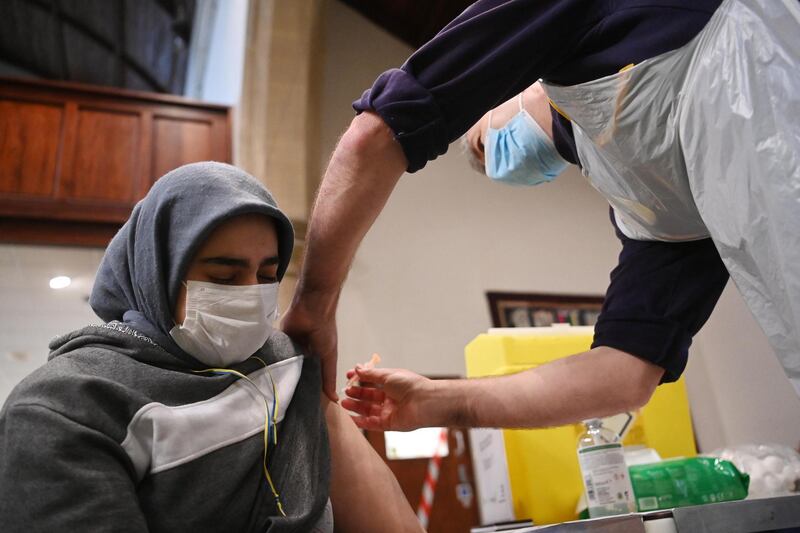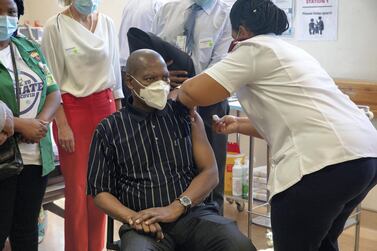Two months after delivering its first vaccine shots, the EU is still struggling to get its Covid-19 inoculation drive up to speed.
EU leaders are meeting on Thursday to start the process, fearing that new virus variants might spread faster than Europe’s response.
At the video conference, the leaders will look at ways to improve the bloc’s vaccine introduction as the EU’s executive arm, the European Commission, presses pharmaceutical companies to respect the terms of their contracts.
Officials also want to fast-track vaccine authorisations.
More than 21 million coronavirus cases have been recorded and about 515,000 people have died from it in the EU’s 27 countries, the European Centre for Disease Protection and Control said.
Italy, France, Germany and Spain have the most coronavirus deaths in the EU, although all trail Britain, which has Europe’s highest virus death toll at more than 121,000.
Czech Prime Minister Andrej Babis is worried about “a total catastrophe” with overburdened hospitals.
Germany fears the effects of new variants and the Netherlands is seeing a surge in cases.
Given the spread of the disease, there should be little appetite to ease up on travel and other restrictions too soon.
“The epidemiological situation remains serious and the new variants pose additional challenges,” the leaders will say, according to a draft summit statement seen by AP.
"We must therefore uphold tight restrictions while stepping up efforts to accelerate the provision of vaccines."
But public pressure to relax measures is building.
The Netherlands has eased some lockdown measures in what Prime Minister Mark Rutte called a calculated risk to make the year-long crisis “bearable.”
Denmark just allowed some high school pupils to return to classes.
In Belgium, Jean-Marc Nollet, head of the francophone Greens party that is part of the ruling coalition, openly said he no longer followed his own government’s limits on social contacts.
“I am a human being and human contact is something vital,” Mr Nollet said.
But the leaders will say that the crisis is far from over, especially as vaccine production lags behind.
“We need to urgently accelerate the authorisation, production and distribution of vaccines, as well as vaccination," the leaders will say.
"We also need to enhance our surveillance and detection capacity in order to identify variants as early as possible so as to control their spread."
The commission has sealed deals with several companies for well over 2 billion vaccine shots, far more than the EU population of about 450 million.
But only three have been authorised: vaccines from Pfizer-BioNTech, Moderna and AstraZeneca, which all involve two shots over several weeks.
In March, the bloc could also authorise the Johnson & Johnson one-shot vaccine.
But the EU was heavily criticised for taking almost a month longer than Britain to approve the first vaccines and for lagging so far behind in vaccinating its people.
The leaders’ debate will focus as much on speeding up authorisations as boosting vaccine production and cutting delivery bottlenecks.
Commission Vice President Maros Sefcovic said one way might be to “agree upon legislation to allow for the emergency authorisation of vaccines at the EU level".
"To date, this is only possible at national level,” Mr Sefcovic said.
And as curfew-weary, mask-wearing European citizens hope for relief and the prospect of a real summer holiday this year, the summit will focus on when to ease restrictions.
Leaders will also look at the possibility of a future vaccination certificate so people can travel more conveniently.
Such a certificate has been demanded by southern EU nations that depend heavily on tourism, and they consider it a way to avert a second disastrous summer season.
One official from an EU nation said talks would also centre on ways to dovetail any vaccine certificate with similar efforts at the World Health Organisation, the Organisation for Economic Co-operation and Development and the International Air Transport Association.
But European travel restrictions do not look like they will be eased any time soon.
Belgium, home to the EU’s institutions, has a ban on all non-essential travel, which could remain until the end of March.
The country has been criticised by some neighbours for what they see as a disproportionate use of border controls.
“For the time being, non-essential travel needs to be restricted,” the leaders say in their statement, which still could be modified.
But they say “the unhindered flow of goods and services within the single market must be ensured".
With leaders conscious that the pandemic will not end unless it is defeated everywhere, summit talks will also touch on getting vaccines to other countries in need, notably in Africa, through the UN-backed Covax programme.








